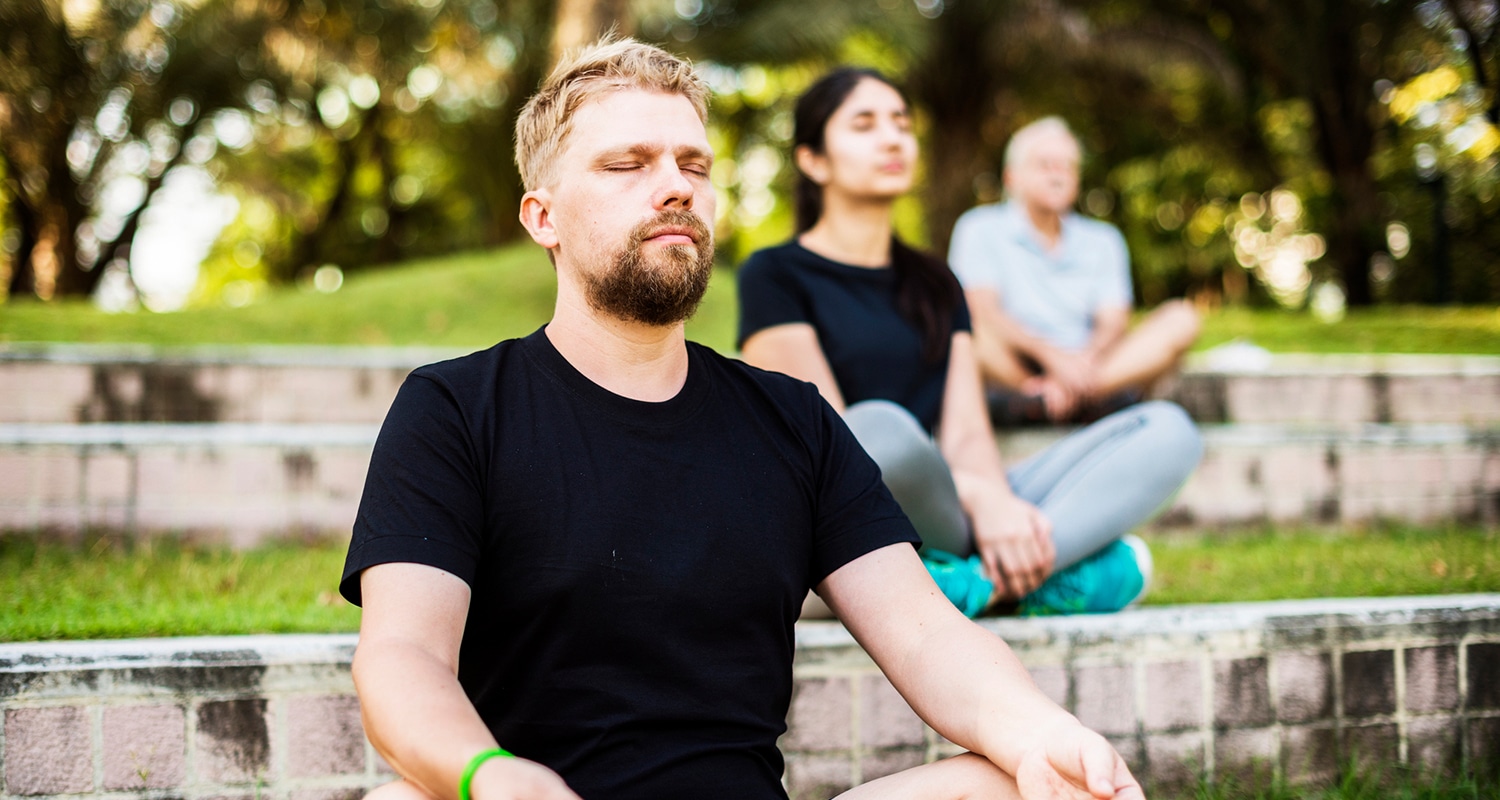
[tldr]
- Stress is an epidemic, and it wrecks your body in more ways than one. Fortunately, you don’t have to let stress hold you back.
- These Bulletproof-approved stress management tips are designed to help you cool down in the middle of a hectic day and build your resilience over time.
- Meditate. Go outside. Work out. Get better sleep. These techniques work because they give your brain and body time to recharge.
- Certain types of stress can make you stronger. Physical and mental challenges can rewire your brain so you’re better prepared to handle whatever life throws your way.
[/tldr]
Raise your hand if this scene is familiar: You’re frazzled after work, so you binge on comfort foods that taste so good but make you feel like a bloat-monster. When you try to go to bed, you lie awake for hours. You start the next day feeling hungover and sluggish, which makes it that much harder to face obstacles at work and home and life, so you feel even more wiped out. Repeat ad infinitum. Ugh.
Stress is an epidemic, and it wrecks your body in more ways than one. It makes your hair fall out, your pants fit tight, and your immune system (and your hormones, gut, mood, and poor, overloaded brain) go haywire.[ref url=”https://www.ncbi.nlm.nih.gov/pubmed/22169588″][ref url=”https://www.ncbi.nlm.nih.gov/pubmed/2186751″][ref url=”https://www.sciencedirect.com/science/article/pii/S1470204504015979″][ref url=”http://psycnet.apa.org/record/1988-09946-001″] The good news is, you don’t have to let stress hold you back. Keep these Bulletproof-approved stress management techniques in your personal toolkit. They’ll help you take a step back from your biggest stressors, recharge in the middle of a high-strung day, and prepare for anything life throws at you.
A hectic schedule? No problem. A last-minute deadline? Bring it on. What are your go-to methods to navigate stressful waters? Share your tips in the comments.
Stress management tips for the chronically stressed out
Meditate
In Bulletproof founder Dave Asprey’s new book “Game Changers,” meditation was one of the most commonly cited recommendations top-level leaders and innovators made to perform better at life. “In huge numbers, they talked about meditating and using breathing techniques to find a state of peace and calm,” Asprey says.
It makes sense: On a biological level, meditation has been shown to significantly reduce levels of stress hormones cortisol and epinephrine.[ref url=”https://onlinelibrary.wiley.com/doi/full/10.1002/da.21964″] Left unchecked, these hormones contribute to system-wide damage, including chronic disease, fatigue, sleep difficulties, and depression. Learn more about the benefits of meditation for stress relief.
It’s easy to start a meditation practice. Try one of these meditation apps to get your om on. Download the free 20-minute guided yoga nidra meditation on the Bulletproof Library of Resources. For extra biohacker points, meditate in a sensory deprivation tank. Whatever you do, aim to meditate for at least five to 10 minutes every day. Slowly increase your time once it starts to feel like a habit.
Related: 30-Day Meditation Challenge for Beginners (with guided audio)
Hack your brain
Did you know you can rewire your brain so it’s easier to chill out? The vagus nerve is a two-way network of communication between your brain and your major organs. Your vagal pathways regulate things like anxiety, respiration, and heart rate.[ref url=”https://journal.chestnet.org/article/S0012-3692(15)31878-X/fulltext”] By hacking your brain, you can effectively reduce overall stress. Learn how to strengthen your vagus nerve. Here’s the short version:
- Heart rate variability (HRV) training: When you’re calm, your heart rate naturally varies. But when your brain is preparing for a fight-or-flight response — aka, freaking out — your heart rate steadies. HRV training teaches you how to control your brain’s stress response. In “The Bulletproof Diet,” Asprey uses an electroencephalogram (EEG) brain-wave monitoring machine to track his HRV. You can also use a device like the OURA ring, which gives you detailed information on your HRV, body temperature, breathing rates, and more.
- Cold thermogenesis: Cold exposure tones the vagus response and measurably reduces stress markers.[ref url=”https://www.ncbi.nlm.nih.gov/pubmed/18785356″] Don’t want to blast yourself with a cold shower? Try this ice face hack.
- Diet: Did you know there’s a connection between your mood and what you eat? Stress can cause an imbalance in your gut bacteria, leading to serious GI disorders like IBS and food allergies — which stress your body even further. The critters in your gut also play a key role in your happiness level. Check out these signs your gut is unhealthy and how to fix it.
- Improve myelin production: The vagus nerve is coated in myelin, a protective covering of fat. The condition of your myelin impacts your mood, attention, and cognitive ability — so, it’s pretty important to take care it. Find out how.
Use supplements to relax
Adaptogenic herbs help you adapt in the face of stress, and they’re powerful supplements to add to your stress management toolkit. They work in a few different ways: Ashwagandha reduces stress by helping the hypothalamic, pituitary, and adrenal glands communicate effectively and by regulating testosterone overproduction,[ref url=”http://www.healingpoints.com/Adrenal.PDF”] while kava contains psychoactive kavalactones that put you in a state of relaxed focus. Discover the best adaptogens to feel less stressed and laser-focused.
Then there are nootropics, or smart drugs. Nootropics enhance brain function and some can provide natural anxiety relief without medication. Your results may vary based on your individual biology and what’s stressing you out. For example, your brain uses an amino acid called L-tyrosine to increase the neurotransmitters dopamine, epinephrine, and norepinephrine. Supplementing with L-tyrosine can improve your brain’s resilience to physical and mental stress. Learn more about the best mood-boosting supplements for depression, anxiety, and stress.
Related: The Best Nootropics for Social Anxiety
Give your mind a break
When you need a quick hack to wind down in the middle of a hectic day, keep these methods in your back pocket:
- Watch this fractal video to lower your stress in seconds
- Use one (or all) of these deep breathing exercises to lower your heart rate and blood pressure pressure.[ref url=”https://www.ncbi.nlm.nih.gov/pmc/articles/PMC3705176/”]
- Try this tapping exercise (Emotional Freedom Technique) on seven specific acupressure points to relieve anxiety and stress
- Take a walk outside (barefoot) to benefit from earthing, the practice of putting yourself in direct contact with the earth’s negative charge. The practice has been shown to reduce stress and improve sleep.[ref url=”http://www.next-up.org/pdf/ACM_Journal_The_Biologic_Effects_of_Grounding_the_Human_Body_During_Sleep_as_Measured_by_Cortisol_evels_and_Subjective_Reporting_of_Sleep_Pain_and_Stress_2004.pdf”][ref url=”https://www.ncbi.nlm.nih.gov/pubmed/15650465/”] Learn more about earthing here. Even if you can’t be barefoot, spending time in nature (aka forest bathing) lowers stress hormone levels, blood pressure, pulse rate, and heart rate variability.[ref url=”http://www.ncbi.nlm.nih.gov/pubmed/19568835″]
- Stop making so many decisions. Decision fatigue is a real problem that saps your willpower and makes it harder to focus. Automate your life, switch to a capsule wardrobe, delegate what you can, and check out the Bulletproof 30-Day Decision Fatigue Challenge for more hacks.
Change your diet
Bad news: Sugar may taste good, but it’s stressing you out — specifically, your gut. Sugar, gluten, dairy, and food additives (like MSG) behave like drugs in your body. When you’re emotional, you’re primed to turn to them for comfort — also known as emotional eating. Switch to a high-fat, low-carb diet to stay full longer, maintain steady blood sugar, and feed your brain with healthy fats. Learn more about what to eat to keep your brain young and strong, even in the face of major stressors.
Related: Is There a Connection Between Brain Health and Depression?
Go to sleep
Once more for the people in the back: GO TO SLEEP. Quality sleep regulates your hormones, gives your body time to repair itself, and improves brain function. A lack of restorative shut-eye raises your blood pressure and stress hormone levels, which increases your risk of chronic disease over time.[ref url=”https://www.ncbi.nlm.nih.gov/pubmed/19506175″][ref url=”https://www.ncbi.nlm.nih.gov/pubmed/9415946″] You don’t have to necessarily get more sleep — just better quality. Find out how to hack your sleep here.
Want to follow an easy, laid-out series of steps to help you sleep better? Check out the Bulletproof 30-Day Sleep Challenge.
Exercise
Your body was built to move, and exercise helps you feel better when life is wearing you down. It literally improves your brain function so you’re more resilient to stress.[ref url=”https://www.ncbi.nlm.nih.gov/pmc/articles/PMC4061837/”][ref url=”https://www.ncbi.nlm.nih.gov/pubmed/10775018″] It eases muscular tension to help you feel more relaxed.[ref url=”https://www.ncbi.nlm.nih.gov/pubmed/27410979″] And it helps you sleep better, which is an overall good move for mental health. Try these five mood-boosting workouts you can do anywhere.
Why it’s okay to feel stressed out sometimes
Here’s an unconventional stress management technique: Embrace it. Certain kinds of stress — specifically, the “what doesn’t kill you makes you stronger” type — actually makes you stronger, according to Andrew Herr, a Department of Defense biotechnologist, in this Bulletproof Radio (iTunes) podcast episode. Herr says the military uses psychology and physical challenges to make their soldiers more resilient to stress.
Why? As difficult as it may be, pushing your limits rewires your brain to handle stress like a boss. You don’t have to be a soldier to benefit from hormesis. Take a cold shower, get out of your comfort zone, try intermittent fasting, or do a high-intensity interval training (HIIT) workout. These challenges boost your resilience by boosting your body’s repair functions and building new connections between brain cells. Plus, it’s fun to get uncomfortable every once in a while. Learn more about the benefits of hormesis.


















